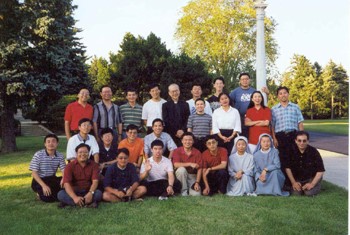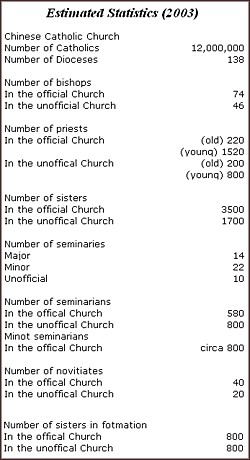
China Bridge (神州橋樑)_2004/Feb
China Church in an Era of Transition
“China is in a era of transition” seems to be a favorite phrase of today’s China-watchers, academics and Sinologists. A number of articles have appeared lately entitled “China in an era of transition.” This transition first and foremost refers to economics, but it also refers to politics, to social development, and sometimes to religion.
Some also see transition as China’s quantum leap from being a rural society to becoming a country of giant megalopolises.
The situation of the Church in China

Many people who come to the Holy Spirit Study Centre ask us to speak to them about the situation of the Church in China. As Father John Cioppa so well expressed it in his talk at the US Catholic Bureau’s 20th National China Conference in New York in November 2003, “I don’t think anyone can just start off by simply talking about the Church in China as though it were an isolated entity. I think it is essential to know something about what is happening in the country as a whole.”
And so, at the beginning of another year, China Bridge will take a quick glance at what has been happening in China that might impact on the Church in China, and then try to suggest what the Catholic Church can do for China in this critical era of transition.
China is more and more affected by pervasive globalisation, urbanisation and its membership in the WTO. In fact, all three of these are part and parcel of the same package, with the WTO propelling China into the vortex of globalisation and globalisation being responsible for much of China’s urbanisation. According to an Indian Jesuit, “The consequences of the present globalisation are many and critical from the point of view of the poor in the developing countries.”
What is globalisation?
There is a general feeling that globalisation favours speculative investors and multinational corporations. It sacrifices social welfare standards and the environment for the sake of international trade and it fosters a consumer culture. It blurs geographical boundaries, often resulting in a loss of identity and a diminution of culture. It is a social process that promotes global exchanges and homogenises peoples, politics and cultures. We have only to take a cursory look at young people throughout the world to verify this. To a significant degree they all dress the same. Jeans constitute the international haute couture available to everyone. Young people in China gather at any of MacDonald’s 560 outlets (with 100 more opening every year) as they do everywhere else in the world for a fast food meal, or at one of China’s more than 420 Kentucky Fried Chicken outlets just as they do elsewhere. They drink the same Coca Cola and Seven Up, log on the same World Wide Web and gang up in cyber-cafes to play noisy video games. They all dance to the same rock’n roll music. They even assemble to watch the beauty contest in which hundreds of young Chinese women are eager to participate.
Effects of globalisaton
Globalisation effects are not all negative. Globalisation can foster growth and freedom and it has raised the standard of living of many people. The resultant wealth, of course, is still not equally divided and does not generally favour the poor and oppressed. Very few poor people can enjoy the goods available in China’s fast growing consumer society. Obviously these global trends all touch religion to some degree. The elements of secularisation affecting religion in the West will soon, through the global process, inevitably find their way into the minds and hearts of the Protestants and Catholics of China as they seek to jump onto China’s modernisation bandwagon.
China’s miracle economic growth
Besides globalisation, staggering economic growth is fast changing the face of China. The 2003 economic growth of some seven to nine percent is nothing short of phenomenal. No country can even begin to match that. Yet, some experts tell us that these figures are deceiving. One noted economist said recently that in spite of these glowing figures, China is a poor country and it will not catch up with Japan until the year 2050. The present rate of growth will help create some 10 million jobs, but that is not nearly enough to sustain the country with its ever-increasing number of unemployed or underemployed.
One huge obstacle to China’s development is its dysfunctional financial and banking system. In spite of this some young entrepreneurs like Ding Lee, the 32 year-old founder of Netease, has managed to accumulate some 7.5 billion RMB in no time at all, making him the richest man in China. How did he do it? He went to the States and took a look at the online games market, came back home and founded the first large-scale online company in China. He became an instant success.
Changes in the political system
But what of China’s political system? Will China’s fast growing economy bring positive changes in its political system? Many are optimistic that China’s rapid economic growth will indeed have a very positive effect. The optimists maintain that one result of the economic miracle will be the emergence of a large middle class who will favour the development of democracy. Democratisation, in turn, will favour the freedom of religion.
Others are not so hopeful. Jean-Luc Domenach, noted French Sinologist, believes that although there is very little left of actual Communism in China – even the Party today is not in a strong position – there are no signs that democracy features in any way in the immediate future and that a crisis in the economic miracle could indeed return strength to the Party.
The Church in the era of transition
In this era of transition, it is legitimate to ask how the Church has profited from the government’s economic growth and openness? Sad to say, very little or not at all. In fact, it has experienced a series of setbacks.
To name a few: stricter government control over the seminaries; on-going persecution of the unregistered church; the issuance of three documents whose aim seems to be to separate the Church in China from the Universal Church; blatant interference in the ordination of new bishops and the use of excessive pressure over the candidates.
Given this reality, does the Church in China have anything to offer the country beyond the struggle for survival?
The Church’s contribution
In analysing China in an era of transition, John Cioppa wrote, “In a society which is becoming more and more capitalistic and less and less communistic, what is happening to people’s lives? The great fear now, even of government propagandists is that China’s “crisis of faith” leaves people with no framework by which to judge right from wrong. Some older Chinese still believe in the traditions of Buddhism and Confucianism and a few middle-aged people still cling to Marxism and Communism, as a meaningful ideology. But today’s young people have written off Communism as a viable belief system and they have found nothing to take its place.” Does the Church in China have anything to offer these young people in this era of transition?
Meeting the challenge

Christianity certainly has a spirituality to offer. In China that spirituality has a special dimension since it has been nurtured by long years of suffering and persecution. It is a spirituality that has been tried and has proved its capacity for faithfulness and loyalty. It has proved its strength in weakness. If, however, the Church in China wishes to make a significant impact on Chinese society today, it must take seriously the injunctions of Vatican II and become a “Church in the Modern World.” If it fails to read the signs of the times, the Church will have nothing to say at this critical juncture in Chinese history.
Catholics in China are a tiny fraction of China’s huge population, but they can be the tiny seed that can grow into something strong and beautiful in service to others. In the midst of the globalisation process, the small community of Christians can, like Jesus, promote the weak and the poor; its faith can help make the world more human and its counter cultural aspects can be a light in China’s ambiguous and frenetic world of capitalism and modernisation. Its light could even shine more brightly if it could reconcile its internal division and help realise the prayer of Jesus at the last Supper, “That all may be one… ” (Jn.17: 22-23).
This is a very critical time for the Church in China. If it fails to make a significant contribution to China’s new society now, it will have very little impact on China’s transition. Its young priests and sisters will abandon the Church. Young educated people will seek out a faith that speaks to them of today’s world and that help them face today’s challenges and problems. To be a Church in the modern world means that the Church’s professional religious can stand their ground with the intellectuals of Chinese society, understand the longings of the human heart for meaning in life and respond to that yearning.
A Church that speaks to the modern world is characterised by integrity and charity. Many people in China seem to have lost hope. The Catholic Church in the modern world is a beacon of hope. In this era of transition when there is so much in China that cries out for forgiveness and harmony, Christianity, the religion of love and mercy, can help bring about mutual forgiveness that results in reconciliation. This would be no mean contribution to China in this era of transition.


 ENG
ENG